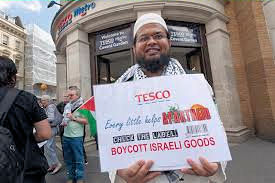
The guidelines are binding in regard to fruit and vegetables, wine, honey, olive oil, eggs, poultry, organic products and cosmetics. In addition, the Guidelines document states that the EU does not recognize Israeli sovereignty beyond the 1967 lines, regardless of the status of those territories under Israeli law, and that regulations and legislation in Europe should reflect this position. Enforcement of the guidelines will be entrusted to the authorities in the 28 EU Member States.
Nowhere in the European resolutions is the word "boycott" mentioned. No ban of any kind is imposed on the entry of settlement products to the European market, the decision whether or not to buy them is left entirely to the personal discretion of European consumers. Despite this, Israeli government spokesmen have responded defensively - ďA reward to terrorism!", "European hypocrisy and hatred for Israel!", "Anti-Semitism!", "Reminiscent of the Nazi Yellow Star!", "We should impose a counter-boycott of European products!".